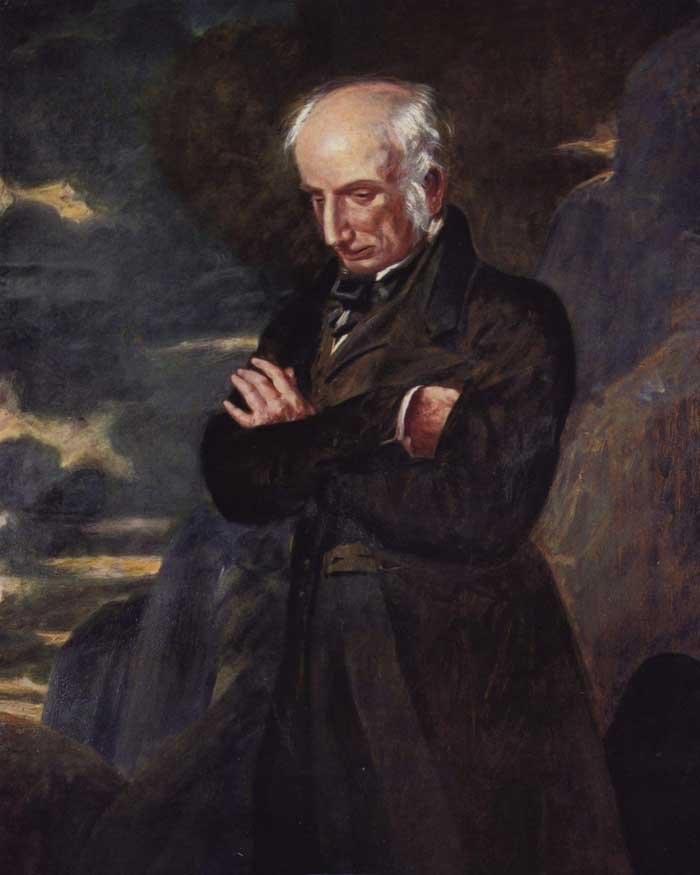William Wordsworth (7 April 1770 – 23 April 1850) was an English Romantic poet who, with Samuel Taylor Coleridge, helped to launch the Romantic Age in English literature with their joint publication Lyrical Ballads (1798).
Wordsworth’s magnum opus is generally considered to be The Prelude, a semi-autobiographical poem of his early years that he revised and expanded a number of times. It was posthumously titled and published by his wife in the year of his death, before which it was generally known as “the poem to Coleridge”.
In November 1791, Wordsworth visited Revolutionary France and became enchanted with the Republican movement. He fell in love with a French woman, Annette Vallon, who, in 1792, gave birth to their daughter Caroline. Financial problems and Britain’s tense relations with France forced him to return to England alone the following year.The Reign of Terror left Wordsworth thoroughly disillusioned with the French Revolution and the outbreak of armed hostilities between Britain and France prevented him from seeing Annette and his daughter for some years.

With the Peace of Amiens again allowing travel to France, in 1802 Wordsworth and his sister Dorothy visited Annette and Caroline in Calais. The purpose of the visit was to prepare Annette for the fact of his forthcoming marriage to Mary Hutchinson. Afterwards he wrote the sonnet “It is a beauteous evening, calm and free”, recalling a seaside walk with the 9-year-old Caroline, whom he had never seen before that visit.
Wordsworth, Dorothy and Coleridge travelled to Germany in the autumn of 1798. While Coleridge was intellectually stimulated by the journey, its main effect on Wordsworth was to produce homesickness. During the harsh winter of 1798–99 Wordsworth lived with Dorothy in Goslar, and, despite extreme stress and loneliness, began work on the autobiographical piece that was later titled The Prelude. He wrote a number of other famous poems in Goslar, including “The Lucy poems”. In the Autumn of 1799, Wordsworth and his sister returned to England and visited the Hutchinson family at Sockburn. When Coleridge arrived back in England he travelled to the North with their publisher Joseph Cottle to meet Wordsworth and undertake a proposed tour of the Lake District. This was the immediate cause of the brother and sister’s settling at Dove Cottage in Grasmere in the Lake District, this time with another poet, Robert Southey, nearby. Wordsworth, Coleridge and Southey came to be known as the “Lake Poets”.
In 1829 Wordsworth and his friend Sir William Rowan Hamilton visited Edgeworthstown and met Marie Edgeworth. She offers a memorable description of him in a letter to Margaret Ruxton of September 27th (she deems Wordsworth to possess a “good philosophical bust”)
Wordsworth was Poet Laureate from 1843 until his death from pleurisy on 23 April 1850.
The best way to keep in touch and to be aware of our events
Don’t forget to confirm your subscription in the Email we just sent you!
Please pre-book your visit over Christmas and New Year at least 24h in advance via Email or Online booking.
MondayClosed
Tuesday10:00 AM - 5:00 PM
Wednesday10:00 AM - 5:00 PM
Thursday10:00 AM - 5:00 PM
Friday10:00 AM - 5:00 PM
Saturday11:00 AM - 5:00 PM
Sunday11:00 AM - 5:00 PM
Adult €7.50
Children 10 to 16 €3
2 Adults & 2 Children €15
Adult is 16 years+
Family Ticket is 4 family members together
Children under ten are free but must be accompanied by an Adult

This project was assisted by Longford Local Community Development Committee, Longford Community Resources Clg. and Longford County Council through the LEADER Programme 2023 -2027 which is part-financed by the EU, “The European Agricultural Fund for Rural Development: Europe investing in rural areas” and the Department of Rural & Community Development
The Maria Edgeworth Centre is operated under the direction of the Edgeworthstown District Development Association (EDDA) – a Not for Profit Voluntary Community based registered charity Reg:223373. Registered Charity Number 20101916
© 2023 Maria Edgeworth Centre – All Rights Reserved